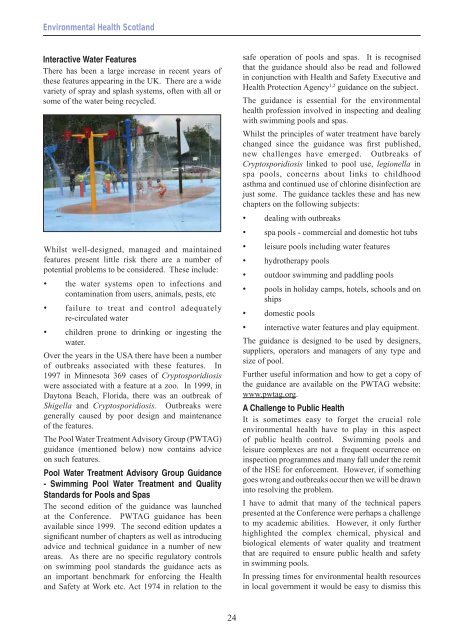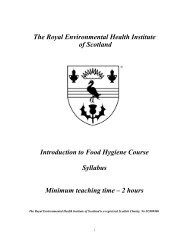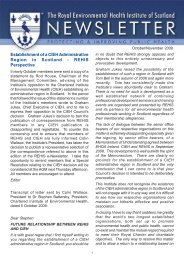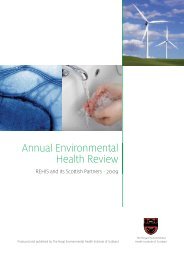Download REHIS Journal 21/3 (Autumn 2009) - The Royal ...
Download REHIS Journal 21/3 (Autumn 2009) - The Royal ...
Download REHIS Journal 21/3 (Autumn 2009) - The Royal ...
Create successful ePaper yourself
Turn your PDF publications into a flip-book with our unique Google optimized e-Paper software.
Environmental Health Scotland<br />
Interactive Water Features<br />
<strong>The</strong>re has been a large increase in recent years of<br />
these features appearing in the UK. <strong>The</strong>re are a wide<br />
variety of spray and splash systems, often with all or<br />
some of the water being recycled.<br />
Whilst well-designed, managed and maintained<br />
features present little risk there are a number of<br />
potential problems to be considered. <strong>The</strong>se include:<br />
• the water systems open to infections and<br />
contamination from users, animals, pests, etc<br />
• failure to treat and control adequately<br />
re-circulated water<br />
• children prone to drinking or ingesting the<br />
water.<br />
Over the years in the USA there have been a number<br />
of outbreaks associated with these features. In<br />
1997 in Minnesota 369 cases of Cryptosporidiosis<br />
were associated with a feature at a zoo. In 1999, in<br />
Daytona Beach, Florida, there was an outbreak of<br />
Shigella and Cryptosporidiosis. Outbreaks were<br />
generally caused by poor design and maintenance<br />
of the features.<br />
<strong>The</strong> Pool Water Treatment Advisory Group (PWTAG)<br />
guidance (mentioned below) now contains advice<br />
on such features.<br />
Pool Water Treatment Advisory Group Guidance<br />
- Swimming Pool Water Treatment and Quality<br />
Standards for Pools and Spas<br />
<strong>The</strong> second edition of the guidance was launched<br />
at the Conference. PWTAG guidance has been<br />
available since 1999. <strong>The</strong> second edition updates a<br />
significant number of chapters as well as introducing<br />
advice and technical guidance in a number of new<br />
areas. As there are no specific regulatory controls<br />
on swimming pool standards the guidance acts as<br />
an important benchmark for enforcing the Health<br />
and Safety at Work etc. Act 1974 in relation to the<br />
safe operation of pools and spas. It is recognised<br />
that the guidance should also be read and followed<br />
in conjunction with Health and Safety Executive and<br />
Health Protection Agency 1,2 guidance on the subject.<br />
<strong>The</strong> guidance is essential for the environmental<br />
health profession involved in inspecting and dealing<br />
with swimming pools and spas.<br />
Whilst the principles of water treatment have barely<br />
changed since the guidance was first published,<br />
new challenges have emerged. Outbreaks of<br />
Cryptosporidiosis linked to pool use, legionella in<br />
spa pools, concerns about links to childhood<br />
asthma and continued use of chlorine disinfection are<br />
just some. <strong>The</strong> guidance tackles these and has new<br />
chapters on the following subjects:<br />
• dealing with outbreaks<br />
• spa pools - commercial and domestic hot tubs<br />
• leisure pools including water features<br />
• hydrotherapy pools<br />
• outdoor swimming and paddling pools<br />
• pools in holiday camps, hotels, schools and on<br />
ships<br />
• domestic pools<br />
• interactive water features and play equipment.<br />
<strong>The</strong> guidance is designed to be used by designers,<br />
suppliers, operators and managers of any type and<br />
size of pool.<br />
Further useful information and how to get a copy of<br />
the guidance are available on the PWTAG website:<br />
www.pwtag.org.<br />
A Challenge to Public Health<br />
It is sometimes easy to forget the crucial role<br />
environmental health have to play in this aspect<br />
of public health control. Swimming pools and<br />
leisure complexes are not a frequent occurrence on<br />
inspection programmes and many fall under the remit<br />
of the HSE for enforcement. However, if something<br />
goes wrong and outbreaks occur then we will be drawn<br />
into resolving the problem.<br />
I have to admit that many of the technical papers<br />
presented at the Conference were perhaps a challenge<br />
to my academic abilities. However, it only further<br />
highlighted the complex chemical, physical and<br />
biological elements of water quality and treatment<br />
that are required to ensure public health and safety<br />
in swimming pools.<br />
In pressing times for environmental health resources<br />
in local government it would be easy to dismiss this<br />
24













